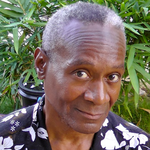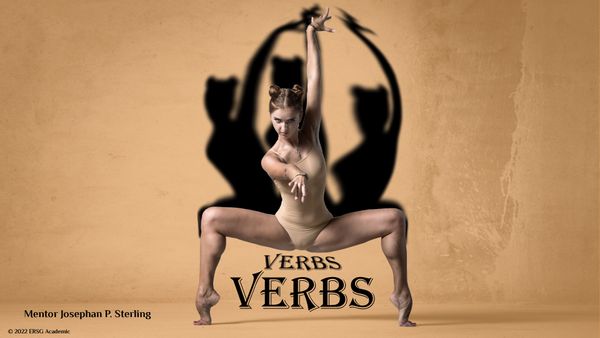0

Verbs!
4 years ago
English Verbs
Verbs Denote Action or State of Being.
Only Verbs can express a complete thought in a single word.
Love!
A word of action. The action of love is in the doing of loving things. I love my family would mean – that I am doing all I am capable of for the benefit of my family. Love (the verb) is always in the image and spirit of good. Not to be confused with love (the noun), that flaccid thing used to express the varying emotions toward religions, animals, chocolate, sex, and most human flaws.
Love.
A state of being. Being love requires that one has a concept of love in their heart, and they endeavor to live in the Light of the Love they perceive. Once the True Light is perceived - One embarks upon the never-ending journey to be the Light perceived. Regrettably, lust (also a verb) is confused with love and is its opposite - very close to hate.
I think I was distracted from the path this Meditation intended to take. Please pardon me - I tend to preach - I'll get back on point - Verbs.
Verbs are a vital component of any sentence. Verbs talk about the action or the state of any noun or subject. Meaning, that verbs show what the [subject] is doing or what is the state or situation of the [subject].
Verbs are king in English. With verbs, you can make one-word sentences, for example: Stop! You cannot make a one-word sentence with any other type of word.
Verbs either denote Action or the State of Being. Run, jump, and sing all describe an action.
Verbs like be, exist, seem, and belong, convey a state of being or existence.
A verb always has a subject. In the sentence “John speaks English,” [John] is the subject and [speaks] is the verb.
Wait a minute! I said that [stop!] is a sentence - well then, who is the subject in stop? These single-word sentences are second-person commands - any person hearing the order should know to who it is said.
To clarify, we can say that verbs are words that tell us what a subject does or is.
They describe:
Action (Joan playsfootball.)
State of being (Anthony isrude.)
Linking (Joan looksgood.)
Verbs change form. Nouns, pronouns, adjectives, adverbs, prepositions, conjunctions, and interjections do not alter form (although nouns can have singular and plural forms).
For example, the verb to swim has four forms:
To swim: swim, swam, swum, swimming
We divide verbs into two broad classifications:
1. Helping Verbs
2, Main Verbs
Primary Helping Verbs (3 Verbs)
These are the verbs be, do, and have. Note that we can use these three verbs as helping or main verbs. For now, we talk about them as helping verbs. We use them in the following cases:
be
To make continuous tenses (He iseating dinner.)
To make the passive (Pearls arecreated in oysters.)
have
To make perfect tenses (I havefinished my dinner.)
do
To make negatives (I donot like oysters.)
To ask questions (Do you want dinner?)
To show emphasis (I dowant you to enjoy dinner.)
To stand for the main verb in some constructions (She runs faster than he does.) (she does -run faster)
Modal helping verbs (10verbs)
We use modal helping verbs to “modify” the meaning of the main verb in some way.
A modal helping verb expresses necessity or possibility and changes the main verb in that sense.
These are the modal verbs:
can, could
I can run very fast -- I wish I could run very fast
may, might
May I come with you? -- I might let you come with me if you kiss me.
will, would
Will you give me your love? --I would if you were not so mean to me.
shall, should
How shall I kiss you? -- You should kiss me with all your heart.
must
You must think you are so handsome. - There must be something you like about me.
ought to
You ought to be humbler. -- I ought to be, but I’m not.
Main Verbs
Now imagine that someone says to you:
I teach. (You teach what?) -- I teach English
People eat. (What do people eat?) -- People eat at restaurants.
The Earth rotates. (What about the Earth rotates?) -- The Earth rotates around
Transitive and intransitive verbs
A transitive verb takes a direct object:
Somebody killed the President.
I saw an elephant.
We are watching TV.
He speaks English.
An intransitive verb does not have a direct object:
He died. I failed.
You stop. He shouts.
Linking verbs
Considered alone, a linking verb does not have much meaning. It “links” the subject to what is said about the subject. Usually, a linking verb shows equality or a change to a different state or place. Linking verbs are always intransitive (but not all intransitive verbs are linking verbs).
Mary is a teacher. (Mary = teacher)
Tara is beautiful. (Tara = beautiful)
That sounds interesting. (that = interesting)
The sky became dark. (the sky > dark)
The bread has gone bad. (bread > bad)
Dynamic and Stative verbs
Some verbs describe an action. They are called “dynamic”, and can be used with continuous tenses.
Dynamic verbs (examples): hit, explode, fight, run, go
I always hit the ball.
Did the bomb explode?
I like to fight.
I cannot run. Please go.
Other verbs describe state (non-action, a situation). They are called “Stative”, and cannot normally be used with continuous tenses
Stative verbs (examples): be, like, love, prefer, wish, impress, please, surprise, hear, see, sound, belong to, consist of, contain, include, need, appear, resemble, seem.
Please be good.
I like you.
Do you love me?
I prefer you.
For what will I wish?
Impress me. Please me.
Surprise me. Can you hear?
Do you see? I like the sound.
Who does this belong to?
What does this consist of?
What does this contain?
Include this.
Understand my need.
Appear interested.
Resemble something?
How does it seem?
Regular and irregular verbs
This is more a question of vocabulary than of grammar. The only real difference between regular and irregular verbs is that they have different endings for their past tense and past participle forms.
For regular verbs, the past tense ending, and past participle ending is always the same: -ed.
For irregular verbs, the past tense ending, and the past participle ending is variable, so it is necessary to learn them by heart.
Regular verbs: base, past tense, past participle
look, looked, looked -ex- Look at him. I looked at him. He looked good.
work, worked, worked -ex- Work with me. You worked with me. She worked there.
Irregular verbs: base, past tense, past participle
buy, bought, bought
Let’s buy some food. I bought the food yesterday, The food was cut yesterday.
cut, cut, cut
Let’s cut the bread. I cut the bread yesterday. Yesterday the bread was cut.
do, did, done
Let’s do this.
We did this already.
That was done yesterday.
Well, there you have it, English verbs in a nutshell.
Do I recommend that you devote hours of study to memorizing all the above terms? NO!
It is enough you read this meditation and have a general understanding of English verbs.
I insist that there is a logic to English as with most all languages.
Invest your time in reading a variety of contemporary English novels.
All the above mumbo jumbo is for the English academics who love making English learning as confusing as imaginable.
I do not teach English grammar! English Speaking and Writing are my passions.
Mentor Josephan
English Ready Set Go!
Are you ready to speak English or not!
